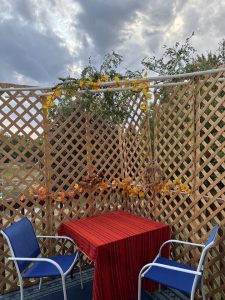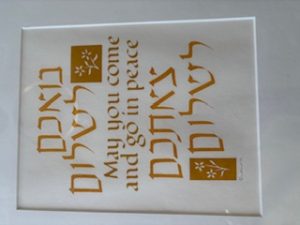Today is Shabbat and Sukkot. Sukkot is described as zeman simchateinu, the time of our joy. I know a little something about joy. It is, after all my middle name, the name that my family uses and that I talk to myself in. This morning I purposely drank out of an old coffee mug my mother had given me years ago. It says JOY all around the top, and has many ornaments. But one is broken. I call it my broken joy mug. I have even started writing a book about joy in Judaism.
Sukkot has always been my favorite Jewish holy day. I remember decorating the sukkah at the temple as a kid. I remember my freshman year at Tufts when I learned about an allen wrench, necessary to building that sukkah, and then it snowed when we slept in it. I remember Sukkot in Israel and not going to Egypt during the Sukkot break because that was the year Sadat was assassinated, and Brandeis wasn’t sending Jewish kids to Egypt that year. I remember performing a wedding for one of my own bridesmaids during Sukkot and dancing the night away to Frank Sinatra. I remember building and decorating any number of sukkot with Simon, in Chelmsford and then here. Entertaining and welcoming guests. Shaking the lulav and the etrog with all sorts of students.
Words are important. Sarah Tuttle-Singer reminded me of that when she was talking about news reporting. It matters whether you call Hamas militants or terrorists. Words need to be precise. There are multiple words for joy, in English: joy, gladness, happiness, content, delight, elation. That list goes on.
Hebrew has multiple words for joy as well:
- Simcha, the one we probably know best, is used for joy, happiness, gladness . It also refers to a happy occasion like a wedding or B-mitzvah.
- Osher denotes a deeper, more profound and lasting happiness. Our prayer Ashrei has the same root. Happy is the one who dwells in the House of the Lord. It also comes with a send of richness and contentment.
- Gilah can mean an ecstatic or exuberant outburst of joy.
- Ditza carries with it a sense of sublime or noble joy.
- Sasson refers to a sudden or unexpected happiness.
- Chedva is a joy or gladness, often the happiness of togetherness or unity and thus is included in marriage blessings.
- Rinah is a song, a joyful cry or shout of happiness.
- Masos is great exultation or great rejoicing.
We use many of them in the sheva brachot, the blessings of a marriage. Listen for them:
Sameach TeSamach Re’im Ahuvim, KeSamechacha Yetzircha BeGan Eden MiKedem. Baruch Ata HaShem, MeSame’ach Chatan VeKalah
Let the loving couple be very happy, just as You made Your creation happy in the garden of Eden, so long ago. You are blessed, Lord, who makes the bridegroom and the bride happy.
Baruch Ata HaShem Elokainu Melech HaOlam, Asher Barah Sasson VeSimcha, Chatan VeKalah, Gila Rina, Ditza VeChedva, Ahava VeAchava, VeShalom VeRe’ut. MeHera HaShem Elokeinu Yishama BeArei Yehudah U’Vchutzot Yerushalayim, Kol Sasson V’eKol Simcha, Kol Chatan V’eKol Kalah, Kol Mitzhalot Chatanim MeChupatam, U’Nearim Mimishte Neginatam. Baruch Ata HaShem MeSame’ach Chatan Im Hakalah.
You are blessed, Lord our G-d, the sovereign of the world, who created joy and celebration, bridegroom and bride, rejoicing, jubilation, pleasure and delight, love and brotherhood, peace and friendship. May there soon be heard, Lord our G-d, in the cities of Judea and in the streets of Jerusalem, the sound of joy and the sound of celebration, the voice of a bridegroom and the voice of a bride, the happy shouting of bridegrooms from their weddings and of young men from their feasts of song. You are blessed, Lord, who makes the bridegroom and the bride rejoice together.
Please, G-d, may there soon be heard, Lord our G-d, in the cities of Judea and in the streets of Jerusalem, the sound of joy and the sound of celebration.
This is a complicated weekend. We are celebrating Sukkot and we are waiting. Waiting. Waiting. It requires patience, savlanut in Hebrew and hope. Tikvah. The ceasefire seems to be holding. Palestinians are moving back throughout the Gaza Strip. Aid is starting to move in. Later this weekend, or perhaps Monday, the hostages are supposed to be returned. These are the first, I emphasize, the first steps to peace.
“We could not be happier,” said someone in what has become known as “Hostage Sqaure,” said. I heard a rabbi say he was “elated.”
Some of you often remind me that you cannot command an emotion. That’s true. While I applaud this possible resolution of a two-year war, I am not yet elated. I am not yet happy. I think the best word I can come up with is relieved. Cautiously optimistic. Worried about what may come next. And perhaps a realist. We’ve been here before.
It would be amazing if the hostages actually come home. The reporting is that there are still 48 hostages, 20 living two of whom are in bad shape. There were 1200 people murdered in the initial onslaught on October 7th. There were women who were raped. There have been Israelites who were displaced both in the north and the south, living in hotels. Hotel ballrooms turned into classrooms for students. There is the ongoing rising anti-semitism, which was a thing even before October 7th. Just today there was a large rally in London of pro-Palestinian activists. London, just after the massacre last week in Manchester. And there are too many deaths. Israeli soldiers in Gaza. And whatever the real number is, 60K+ Gazans, many of whom were women and children.
One night this week I heard an interview of Shirii Bibas’s cousin, Yifat Zailer on Anderson Cooper. As a young mother with a child one month younger than Kafir, she said, “I want to laugh without guilt. I want to go to sleep without anxiety that someone will come into my home and take me.” She asked to say one more thing at the end of the very poignant interview. “no more children will die because of grown-ups’ mistakes”
Another person said: “This agreement will not bring back my son, who was killed in Gaza on 1.1.24, but he and my other son both fought in this war and dreamed of rescuing hostages. Today, also the day that we dedicate a park in memory of Amichai Yisrael Yehoshua Oster, I have so many complicated feelings. I will be so happy to see the hostages back here and reunited with their families, and I will continue to mourn our loss.”
Eleh Ezcarah. We remember. We remember it all. These are the words from the martyrology from Yom Kippur. We remember it all.
Today we read as part of our special Torah portion for Sukkot, the 13 Attributes of the Divine, that we read over and over again as part of the High Holy Day liturgy. Adonai, Adonai, el rachum v’chanun. a God compassionate and gracious, slow to anger, abounding in kindness and faithfulness, extending kindness to the thousandth generation, forgiving iniquity, transgression, and sin. That’s where the rabbis end it in the liturgy. But it continues with this: “yet not remitting all punishment, but visiting the iniquity of parents upon children and children’s children, upon the third and fourth generations.”
The third and fourth generation. That’s where we are now since the founding of the State of Israel. This is what I wrote my rabbinic thesis on. What “sins” get passed down from generation to generation. I examined domestic violence, often a pattern from generation to generation in families. I looked at German-Jewish reconciliation and I studied peace between Israelis and Palestinians Sometimes it feels like it is already out of date. And sometimes it feels like it oh so current. What the Torah is describing is what we now call generational trauma. It is still happening now.
Ha’aretz had a story yesterday, “Do you know how many generations want revenge now?” https://www.haaretz.com/middle-east-news/palestinians/2025-10-09/ty-article-magazine/.premium/do-you-know-how-many-generations-want-revenge-now-the-future-of-hamas-and-gazans/00000199-c8b6-d198-abdb-dcf7a4720000
I can’t predict entirely what will happen next or even tomorrow. I do know that my research showed that in order for there to be a lasting peace, people need to feel safe. I doubt very much that either side will wake up tomorrow and feel safe. There needs to be a period of time where trust is rebuilt. I don’t know how long that will take, but I suspect generations.
Sukkot is a holiday of remembrance, In every joyous moment there is some sadness. While there are many explanations, it is why we break a glass at a wedding. Either we are mourning the destruction of the Temple. That’s a long , long time to be sad. Or we are missing the people that we wish were be able to be there.
Sukkot is one of four times a year, Yom Kippur, Sukkot, Passover and Shavuot, that we recite the Yizkor prayers. Tomorrow we will hold our Sukkot yizkor service at 11:15 with time to remember all
In Kohelet, Ecclesiastes which teaches that there is a time for everything, a time for peace and a time for war for example, we also learn, “It is better to go to a house of mourning than to a house of feasting; for that is the end of every man, and a living one should take it to heart.”
Yet Judaism is about joy and peace. For thousands of years, we have prayed for peace, we have hoped for peace, we have dreamed of peace, we have worked for peace. We will continue to do so. Rabbi Nachman of Bratzlev said, “Never despair, never.”
Tonight the Cubs play in the decisive game of the playoffs. A victory will bring joy to many, sadness to others. I am hoping we don’t need this line at the end of the game: “There is no joy in Mudville. Mighty Casey has struck out.” May the Cubs win and may there be a pervasive peace and the hostages returned home. Speedily and in our day. Amen.

